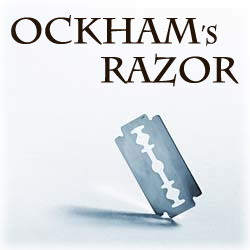

You can see how Ockham’s passion for parsimony (and his Franciscan love of simplicity!) led him to this view: Reality is a much simpler place if we don’t bother ourselves with the realm of Forms and philosophical discourse on the Ideas in God’s Mind. “Mankind” is, in the nominalist view, just a way that we organize ideas in our minds. They propose that universals are mere categories created in the human mind, without any extra-mental reality of their own. Aristotle (384-322 B.C.E.) held to another form of realism, called semi-realism he held that universals are real but that they exist in nature and in things, not independently in a separate realm. One noteworthy kind of Platonic realism was that of Augustine (354-430 C.E., left), who proposed that Platonic Forms are Ideas in the mind of God. In fact, Plato believed that the Forms were the ultimate reality, of which particulars merely participate in a shadowy way. Plato believed that abstract categories such as “mankind” are real. The ancient Greek philosopher Plato (429?–347 B.C.E.) was the archetypal realist.

Donald Trump is a real tangible specific person, whereas mankind is a concept, of which Donald Trump is an example. A universal is a category of being - for example, “mankind” is a universal, and “Donald Trump” is a particular. Nominalism is the view that universals exist only as concepts in the mind, but not in reality. Ockham loved simplicity, true to the Franciscan spirit, but such love of parsimony led him to a profound philosophical error - the error that I think is at the root of all modernist error. But the generalization expresses a truth about the Franciscan/Dominican divide that is itself a reflection of perennial styles of human knowledge. Aquinas wrote extensively on Divine and human will and love. Duns Scotus (1266–1308), a brilliant Franciscan philosopher and contemporary of Aquinas, was a rigorous and meticulous logician. This is of course a radical generalization. The Franciscans, in contrast, stressed the importance of the Divine and human will, and stressed the primacy of love over reason. The Dominicans, for whom Thomas Aquinas is the consummate example, emphasized the Divine intellect as the source of God’s actions and favored intellectual philosophical rigor, even at the expense of brevity. His views are certainly Franciscan in flavor. I think that Ockham’s razor provides a glimpse into Ockham’s soul, so to speak. Aquinas would undoubtedly agree with Ockham that we should not multiply explanations unnecessarily but he would also insist that we follow logic and evidence wherever it takes us, even beyond parsimony. This was in contrast to his contemporary Thomas Aquinas (1225–1274). They must instead choose the most parsimonious logic. In effect, he said that Christians should not use the most rigorous logic to support Christian doctrine and faith. But he insisted that we can best understand reality by paring it down to essentials and never going beyond these essentials. He acknowledged that reality was likely a very complex matter indeed. Ockham may thus be said to be a methodological minimalist, not a philosophical minimalist. He said that we should trim our understanding of reality to the use of as few concepts as possible for reasons of efficiency, even at the cost of absolute precision. Ockham did not say that complex metaphysical realities don’t exist. The basic idea was not original with him, but he developed and spread it with unprecedented effectiveness. Ockham is best known for his principle of parsimony (Ockham’s Razor): “Plurality is never to be posited without necessity” and “It is pointless to do with more what can be done with fewer.” He taught at Oxford and other institutions in Europe. 1287–1347), a Franciscan friar, was a prominent 14 th-century philosopher. Share Facebook Twitter LinkedIn Flipboard Print arroba Email


 0 kommentar(er)
0 kommentar(er)
